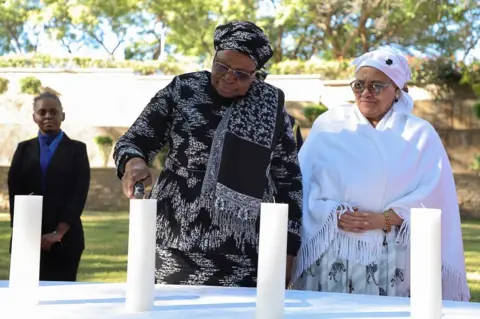Namibia has held its first-ever national day of remembrance for the victims of the genocide committed during German colonial rule. This solemn event commemorates a tragedy often referred to as “Germany’s forgotten genocide,” recognized by historians as the first genocide of the 20th century. Over 70,000 Namibians were systematically killed, and this newly established public holiday aims to honor their memory and acknowledge the suffering they endured.
Decades before the Holocaust, German forces in what was then German South West Africa carried out mass killings, forced labor, and inhumane medical experiments targeting the Ovaherero and Nama peoples, who resisted colonial occupation and the seizure of their resources.
Observed on May 28 each year, Namibia’s Genocide Remembrance Day was launched this past Wednesday. The date was chosen because it marks the day in 1907 when German authorities announced the closure of the camps, following international condemnation of their atrocities.
The national observance includes a candlelight ceremony and a moment of silence near the parliament in Windhoek, reflecting the country’s efforts toward healing and justice.
Following Germany’s defeat in World War I, the country lost control of South West Africa and other colonies, including regions in present-day Togo and Cameroon. However, for decades, Germany failed to acknowledge the genocide that occurred between 1904 and 1908.
It wasn’t until 2021 that Germany officially recognized the genocide and offered a €1.1 billion development aid package to be paid over 30 years. However, the proposal avoided explicit terms like “reparations” or “compensation,” sparking anger in Namibia.
Namibia rejected the proposal, describing it as “a first step” but ultimately inadequate due to its lack of an official apology and failure to address reparations. Many Namibians expressed deep frustration.
“That was the joke of the century,” said Uahimisa Kaapehi, an Ovaherero community member and local official in Swakopmund. “We want our land. Money is nothing. Our wealth was taken, the farms, the cattle.”
A collective representing genocide descendants denounced the 2021 agreement, accusing Germany of perpetuating a “racist mindset” and Namibia of “neo-colonial subservience.” In response, Germany and Namibia have since drafted a revised proposal, reportedly including a formal apology and an extra €50 million in aid.
Still, many Ovaherero and Nama activists say the new deal does not deliver genuine justice or include them in the negotiations. While some view the national genocide remembrance day as a positive step, others insist it cannot replace the need for meaningful reparations and land restitution.
Land restitution is a particularly sensitive demand, as many lands seized during the genocide are still owned by descendants of German settlers.
Historians also highlight the irony that German authorities had themselves demanded reparations from the Ovaherero and Nama for their resistance, confiscating thousands of livestock—estimated to be worth $1.2 million to $8.8 million today. Some scholars argue these losses should be factored into any reparations agreement.
The genocide began in 1904 after German commander Lothar von Trotha issued an extermination order that led to the mass killing of anyone who resisted—men, women, and children alike.
Namibian historian Martha Akawa-Shikufa explained how the German camps operated:
“People got worked to death, many died in the concentration camps from exhaustion. There were pre-printed death certificates simply stating ‘death by exhaustion’, anticipating their deaths because they knew these people wouldn’t survive.”
The bones of many victims were even sent to Germany for unethical racial studies. In recent years, some of these remains have been repatriated to Namibia.
Adding to the present-day controversy, Namibia has also publicly criticized Germany’s support for Israel in the UN’s genocide case regarding Gaza, arguing that it conflicts with Germany’s unresolved accountability for Namibia’s own genocide.
As former President Hage Geingob remarked:
“The German government is yet to fully atone for the genocide it committed on Namibian soil.”

